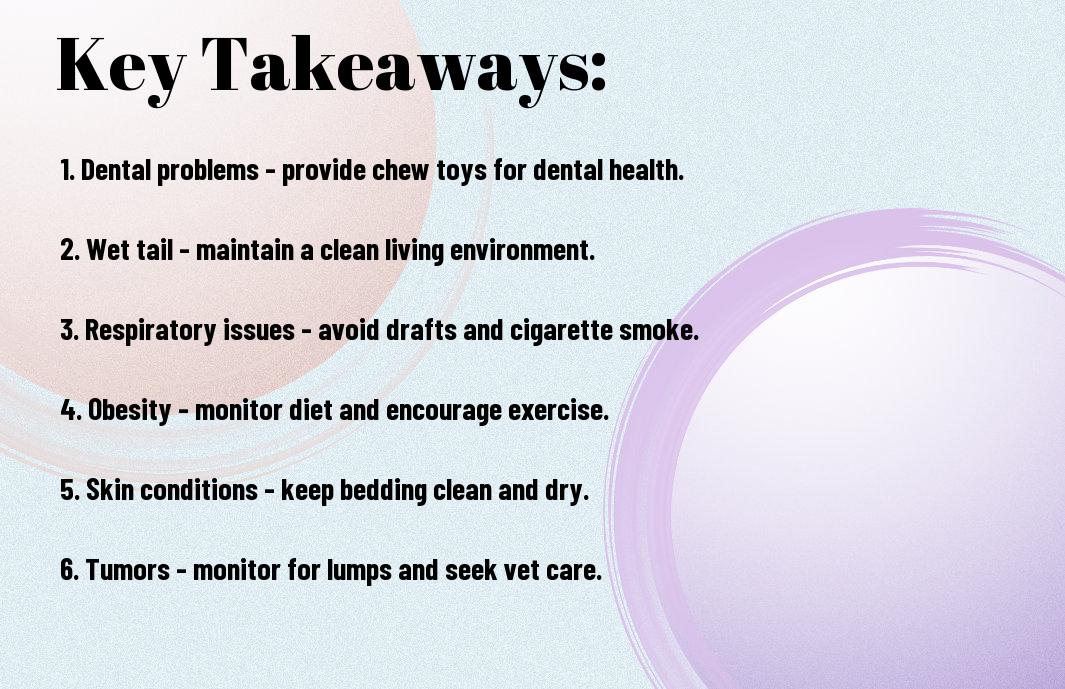Embarking on the journey of owning a pet hamster can be incredibly rewarding, but it’s important to be aware of the common health issues that may arise. By understanding the potential health risks and taking preventative measures, you can ensure that your furry friend lives a long and healthy life. In this blog post, we will discuss the most frequent health problems that hamsters face and provide you with valuable tips on how to safeguard your pet’s well-being.
Key Takeaways:
- Respiratory issues: Respiratory problems are common in pet hamsters due to poor ventilation and dusty bedding. Keep the hamster’s cage clean and provide good ventilation to prevent respiratory issues.
- Dental problems: Hamsters’ teeth grow continuously, and without proper chewing material, dental issues can arise. Provide chew toys and a balanced diet to prevent dental problems in pet hamsters.
- Obesity and diabetes: Like humans, hamsters can also suffer from obesity and diabetes if they are fed a diet high in sugar and fat. Feed your pet hamster a balanced diet and provide opportunities for exercise to prevent obesity and diabetes.

Nutritional Health Concerns
One of the most common health concerns in pet hamsters is related to their nutrition. It’s essential to provide a well-balanced diet to prevent nutritional deficiencies and related health issues in your furry friend.
Obesity in Hamsters: Causes and Prevention
Obesity can be a significant health issue for hamsters, leading to various other health problems such as diabetes, heart disease, and joint issues. The primary cause of obesity in hamsters is overfeeding and a diet high in fat and sugar. To prevent obesity in your hamster, ensure to provide a balanced diet with the right amount of commercial hamster food, fresh vegetables, and occasional treats. Regular exercise is also crucial in preventing obesity, so be sure to provide a suitable exercise wheel and other toys for physical activity.
Scurvy: Vitamin C Deficiency in Hamsters
Vitamin C deficiency, also known as scurvy, is a common nutritional health concern in hamsters. Hamsters cannot produce their own vitamin C, so they rely on receiving an adequate amount through their diet. A lack of vitamin C can lead to symptoms such as lethargy, rough coat, swollen joints, and eventually, death if left untreated. To prevent scurvy, ensure to provide a diet rich in vitamin C through fresh fruits and vegetables such as bell peppers, broccoli, and strawberries. Adding vitamin C supplements to your hamster’s water is also an option to prevent deficiency.
Digestive System Disorders
Your hamster’s digestive system is a delicate and essential part of their overall health. Digestive system disorders are common in pet hamsters and can lead to serious health issues if not addressed promptly. Being aware of the potential problems and taking preventive measures can help keep your hamster healthy and happy.
Diarrhea in Hamsters: Causes and Treatments
Diarrhea in hamsters can be caused by a variety of factors, including dietary changes, stress, bacterial infections, or parasites. If you notice your hamster having loose or watery stools, it’s important to monitor their condition closely and seek veterinary care if the diarrhea persists. Treatment may include adjusting their diet, providing probiotics, or medication to address any underlying infections.
Impaction and Parasites: Maintaining Digestive Health
Impaction occurs when a hamster’s digestive tract becomes blocked, often due to ingestion of bedding materials or improper food. Additionally, parasites such as worms can also disrupt your hamster’s digestive health. To prevent impaction, ensure that your hamster has access to safe bedding materials and a balanced diet. Regularly cleaning their habitat and monitoring for signs of parasites can help maintain their digestive health.
Respiratory and Skin Conditions
Despite being small, hamsters are susceptible to various health issues, including respiratory and skin conditions. These can be caused by a variety of factors, including poor living conditions, stress, and genetics. Recognizing the symptoms of these conditions and taking preventive measures can help keep your pet healthy and happy.
Respiratory Infections: Symptoms and Prevention
Respiratory infections are common in pet hamsters and can be caused by bacteria, viruses, or environmental factors such as poor ventilation or exposure to drafts. Symptoms include sneezing, wheezing, nasal discharge, and labored breathing. If left untreated, respiratory infections can lead to more serious health issues, such as pneumonia. To prevent respiratory infections, ensure your hamster’s living environment is clean and well-ventilated. Avoid exposing them to cigarette smoke, dust, or extreme temperature changes. If you notice any signs of respiratory distress in your hamster, it is essential to seek veterinary care immediately.
Skin Problems: Identifying Mites and Other Dermatological Issues
Skin problems such as mites and fungal infections can cause discomfort and distress for your pet. Symptoms of skin issues in hamsters include itching, hair loss, redness, and visible parasites on their skin. If left untreated, these conditions can lead to severe skin infections and even systemic illness. To prevent skin problems, make sure your hamster’s living environment is clean and hygienic. Regularly inspect your pet for any signs of skin issues, and consult a vet if you notice anything unusual. Furthermore, providing a balanced diet and appropriate grooming can help maintain your hamster’s skin health.
Behavioral and Genetic Health Issues
Lastly, it’s important to understand and address the behavioral and genetic health issues that can affect your pet hamster. These issues can have a significant impact on your hamster’s overall well-being and quality of life.
Stress-Induced Behaviors and Their Prevention
Stress-induced behaviors, such as repetitive chewing or gnawing, are common in hamsters and can lead to serious health problems if not addressed. These behaviors are often the result of an inadequate or stressful environment. To prevent stress-induced behaviors, make sure that your hamster’s cage is spacious, equipped with plenty of enrichment, and located in a quiet area of your home. Providing opportunities for exercise and mental stimulation through toys and playtime can also help prevent stress-related behaviors.
Genetic Diseases and Breeding Considerations
Genetic diseases can pose a significant health risk for pet hamsters. It’s important to be aware of the potential genetic health issues that may be present in certain hamster breeds. Before acquiring a hamster, do thorough research on the breed to understand any predispositions to genetic diseases. Additionally, if you’re considering breeding hamsters, it’s crucial to understand the hereditary health concerns that can be passed down to offspring. Responsible breeding practices, such as genetic testing and selecting healthy breeding stock, are essential to minimize the risk of genetic diseases in future generations of hamsters.
Preventive Measures and Daily Care
However, preventing health issues in your pet hamster starts with regular veterinary check-ups and daily care routines to promote optimal health.
Regular Veterinary Check-ups for Hamsters
It’s crucial to schedule regular check-ups with a veterinarian who specializes in small animals, such as hamsters. Your vet can perform a thorough examination to detect any potential health issues early on. Regular check-ups also allow your vet to provide guidance on the best diet, exercise, and environmental conditions for your pet. Additionally, your vet can administer vaccinations and provide treatment for any parasites that could be harmful to your hamster’s health.
Daily Care Routines to Promote Optimal Health
Another important preventive measure is to establish a daily care routine for your hamster. This includes providing a clean and spacious living environment, a proper diet, and regular exercise. Ensure that your hamster has access to fresh water at all times, and clean their living space regularly to prevent the buildup of bacteria and parasites. A balanced diet that includes a variety of fresh fruits, vegetables, and high-quality pellets will help maintain your hamster’s overall health. Additionally, providing opportunities for exercise, such as a hamster wheel or interactive toys, will keep your pet active and prevent obesity-related health issues.
Remember, regular veterinary check-ups and daily care routines are essential in preventing common health issues in pet hamsters. By being proactive in monitoring your hamster’s health and providing a safe, clean, and enriched environment, you can ensure a happy and healthy life for your furry friend.
Conclusion
With this in mind, it’s important to be aware of the most common health issues in pet hamsters and how you can prevent them. By providing a balanced diet, maintaining a clean cage, and keeping an eye on your hamster’s behavior and appearance, you can help prevent conditions such as obesity, dental issues, and skin problems. Regular veterinary check-ups and proper handling are also crucial in keeping your pet hamster healthy and happy. By being proactive and knowledgeable about potential health issues, you can ensure a long and healthy life for your beloved furry friend.
FAQ
Q: What are the most common health issues in pet hamsters?
A: The most common health issues in pet hamsters include dental problems, respiratory infections, and wet tail disease. Dental problems can arise from a lack of gnawing material and can lead to overgrown teeth. Respiratory infections can be caused by ammonia buildup in their cages or drafts. Wet tail disease is a bacterial infection that is often brought on by stress. Recognizing the signs of these health issues early is important for prompt treatment.
Q: How can I prevent dental problems in my pet hamster?
A: To prevent dental problems in your pet hamster, provide them with gnawing material such as wooden chew toys, hay, and mineral stones. These items will help keep their teeth trimmed and healthy. Additionally, feeding them a diet that includes hard foods to chew on, such as seeds and nuts, can also help maintain their dental health. Regularly check their teeth for signs of overgrowth and consult a veterinarian if you notice any issues.
Q: What steps can I take to prevent respiratory infections and wet tail disease in my pet hamster?
A: To prevent respiratory infections in your pet hamster, ensure their cage is kept in a draft-free area and clean it regularly to prevent ammonia buildup. Provide them with a comfortable nesting area that is warm and dry. Additionally, avoid smoking near your hamster’s cage, as smoke can also irritate their respiratory system. To prevent wet tail disease, minimize stress for your pet hamster as much as possible by providing them with a quiet and secure environment. Keep their cage clean and dry to prevent the spread of bacteria. If you notice any symptoms of illness, such as diarrhea or lethargy, seek immediate veterinary care.














